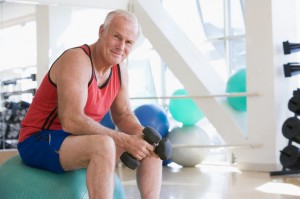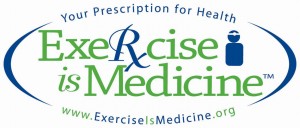A recent documentary on Australia’s ABC Catalyst program highlighted the critical role of exercise in the treatment of many chronic medical conditions, and supported the notion that exercise is medicine.
 The program began by introducing the audience to a chemotherapy patient by the name of Wayne, who was undergoing treatment for bowel cancer. Wayne had started experiencing a significant loss of energy after starting his chemotherapy treatment, leaving him lying on the couch with no energy for weeks. After reporting these symptoms to his doctor, Wayne was prescribed a treatment, that is increasingly gaining recognition amongst medical cancer specialists, to fight a patient’s nausea, lower their risk of developing secondary diseases, and reduce the chance of tumours returning. In fact, the treatment prescribed to Wayne can treat the top ten chronic diseases in Australia, however less than 2% of GPs prescribe it! The treatment is EXERCISE.
The program began by introducing the audience to a chemotherapy patient by the name of Wayne, who was undergoing treatment for bowel cancer. Wayne had started experiencing a significant loss of energy after starting his chemotherapy treatment, leaving him lying on the couch with no energy for weeks. After reporting these symptoms to his doctor, Wayne was prescribed a treatment, that is increasingly gaining recognition amongst medical cancer specialists, to fight a patient’s nausea, lower their risk of developing secondary diseases, and reduce the chance of tumours returning. In fact, the treatment prescribed to Wayne can treat the top ten chronic diseases in Australia, however less than 2% of GPs prescribe it! The treatment is EXERCISE.
This Catalyst report highlighted that most people only exercise when feeling healthy or motivated, which poses the question: how many of us exercise when we are sick? The truth is that most of us don’t. Traditionally, chemotherapy patients have been told to avoid exercise, however it is now known to be an important part of their treatment plan. Wayne is now performing resistance training in an Exercise Physiology clinic, and within a few days of commencing an exercise program he is feeling much better. As a consequence, exercise has been included as a long term strategy for his treatment.
There is now a global push to get doctors to see exercise as medicine. As an Exercise Physiologist, I strongly believe there is no other medicine that can treat a range of chronic conditions like exercise. Unfortunately, some medical practitioners remain “exercise-therapy naive”.
 A second patient, Margaret, introduced in this Catalyst program, is a 74-year-old woman who has been diagnosed with Type 2 Diabetes. Medication did not cause a substantial improvement in her blood sugar levels, so she turned to exercise to help improve her condition. In the program, Margaret is shown performing strength training, which has been shown to be highly effective for lowering blood sugar levels in people with diabetes. In this case, exercise achieved what medication failed to do. Expertly-prescribed exercise reduced Margaret’s blood sugar levels to within the normal accepted range.
A second patient, Margaret, introduced in this Catalyst program, is a 74-year-old woman who has been diagnosed with Type 2 Diabetes. Medication did not cause a substantial improvement in her blood sugar levels, so she turned to exercise to help improve her condition. In the program, Margaret is shown performing strength training, which has been shown to be highly effective for lowering blood sugar levels in people with diabetes. In this case, exercise achieved what medication failed to do. Expertly-prescribed exercise reduced Margaret’s blood sugar levels to within the normal accepted range.
The Exercise Physiologist interviewed explained how there is a dose-response relationship with exercise. That is, particular types of exercise performed at a particular frequency will pose significant benefits for your health. The exercises performed is also effective for treating many conditions. For this reason, exercise is sometimes termed a “polypill”; as in Margaret’s case, most Type 2 Diabetes sufferers have multiple health issues that can be addressed through the effective use of exercise as medicine.
Exercise is also extremely beneficial as part of the treatment for prostate cancer. Prostate cancer thrives in the presence of testosterone. Therefore, treatment for prostate cancer involves the suppression of testosterone. This can lead to a number of side effects including the loss of muscle and bone, along with the impairment to physical function and balance. Testosterone suppressants normally cause a loss in bone density of over 4%. Ihe treatment of prostate cancer, exercise serves an important role as physical activity helps to preserves muscle mass and bone mass throughout treatment, which is particularly beneficial for maintaining balance ability and reducing the risk of bone fractures.
 This Catalyst program also explained how good cardiovascular fitness lowers the effect of other health risk factors, and may even beat cancer itself. Large-scale studies suggest that the right amount of exercise can achieve a drop in mortality rate of approximately 50-60% in several cancers. Clinical Professor David Goldstein contends that correctly-prescribed exercise is the only treatment that can achieve these results without any downsides.
This Catalyst program also explained how good cardiovascular fitness lowers the effect of other health risk factors, and may even beat cancer itself. Large-scale studies suggest that the right amount of exercise can achieve a drop in mortality rate of approximately 50-60% in several cancers. Clinical Professor David Goldstein contends that correctly-prescribed exercise is the only treatment that can achieve these results without any downsides.
At Inspire Fitness, our team of Exercise Physiologists support the notion that exercise should be considered as medicine, and that the health benefits of structured physical activity are so great that they can benefit everyone in any health or disease state. To learn more about the Exercise Physiology services provided by our team of Accredited Exercise Physiologists, please visit our new website: Exercise Physiology at Inspire Fitness.
